Organisational Behaviour Report: BBC Performance and Development
VerifiedAdded on 2020/06/06
|16
|5405
|31
Report
AI Summary
This report analyzes the organisational behaviour within the British Broadcasting Corporation (BBC). It begins by identifying BBC's organisational culture using Handy's cultural typology, examining power, personal, role, and task cultures. The report then explores the impact of organisational power, culture, and politics on individual and team behaviour. It delves into motivational theories, including content theories like Maslow's hierarchy, Herzberg's theory, and McClelland's theory, along with process theories such as Vroom's expectancy theory and equity theory, and their application within the BBC. Furthermore, the report assesses the impact of different team types on BBC's operations and proposes measures to improve performance, incorporating development theories to support cooperation and analysing both positive and negative aspects of organisational behaviour concepts. The report concludes with a critical analysis of these theories and their practical implications for the organisation.
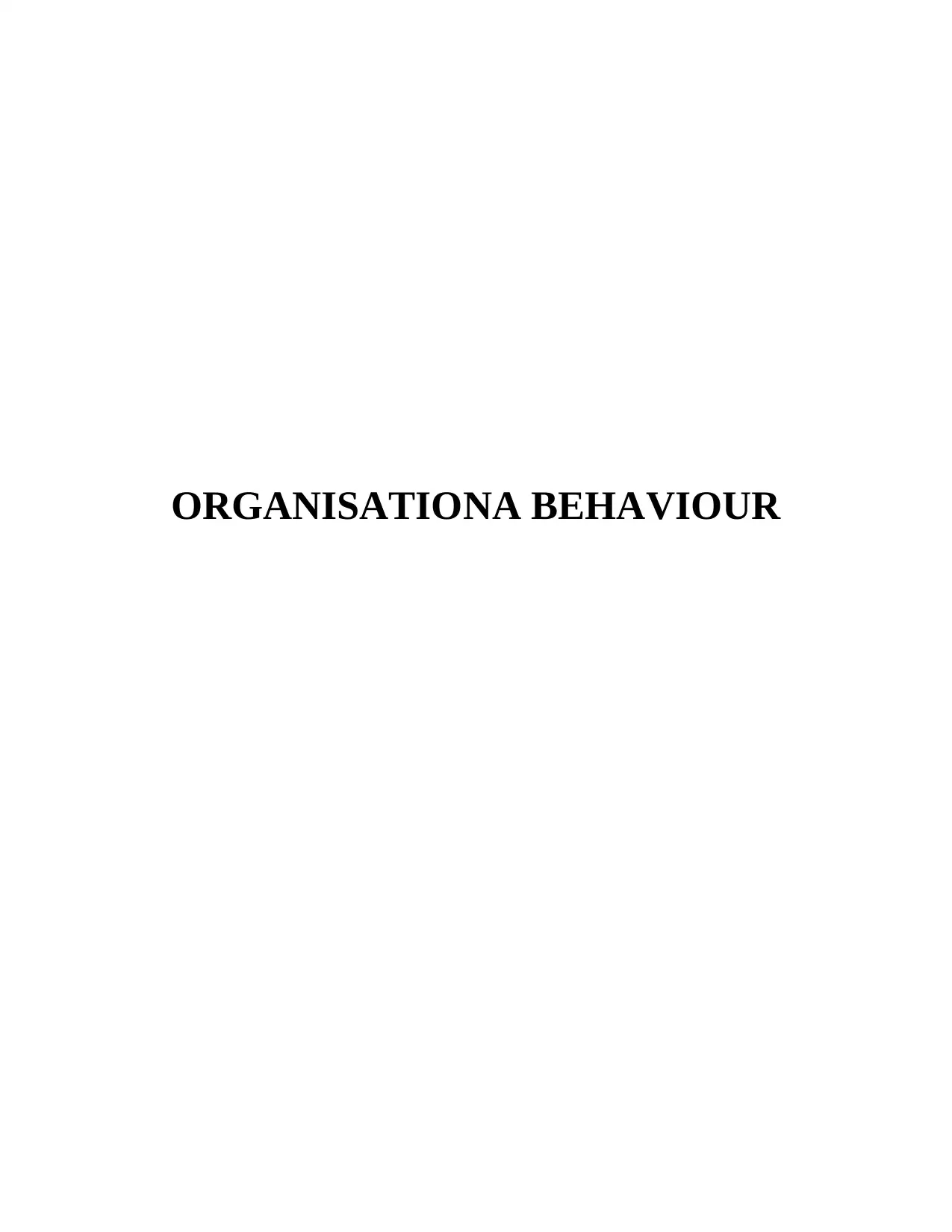
ORGANISATIONA BEHAVIOUR
Paraphrase This Document
Need a fresh take? Get an instant paraphrase of this document with our AI Paraphraser
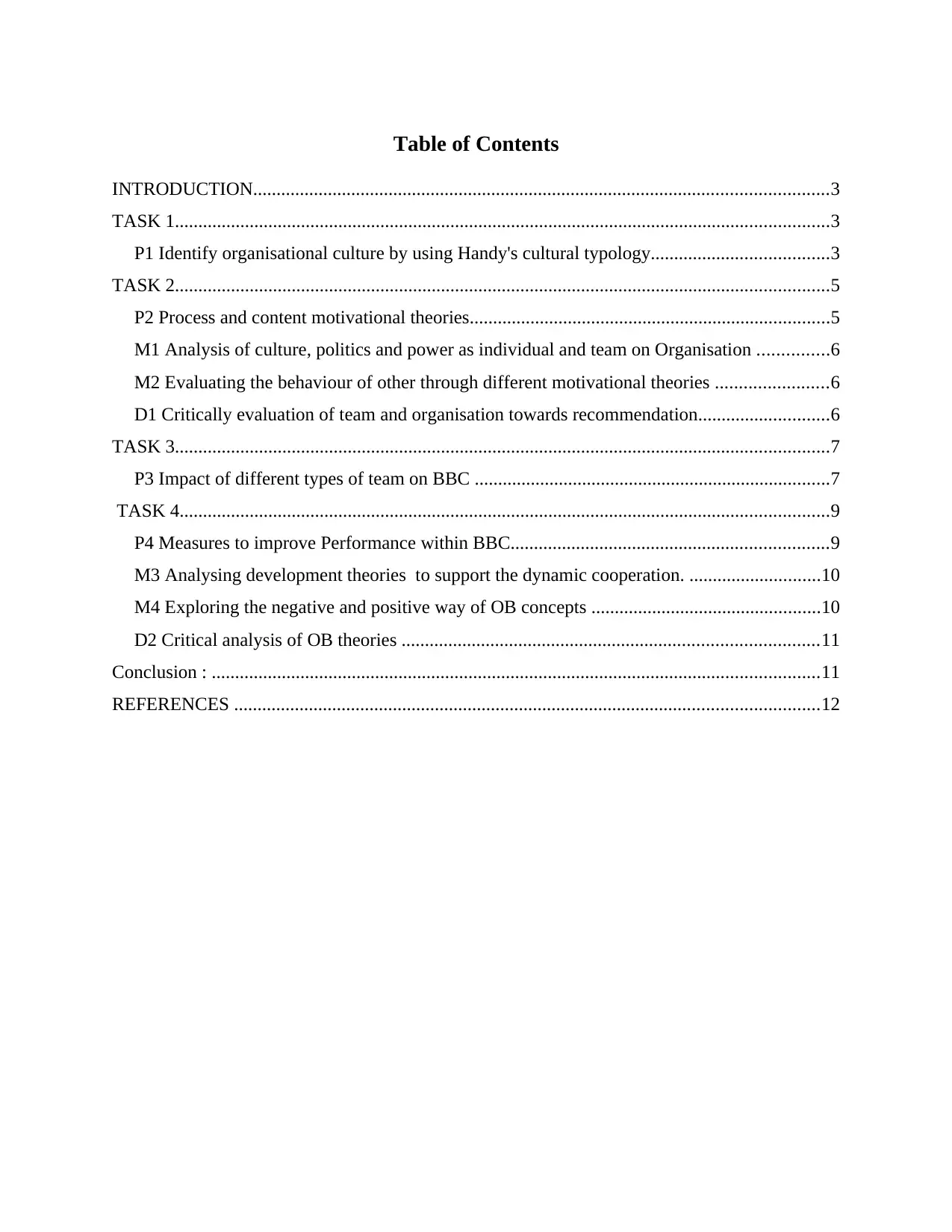
Table of Contents
INTRODUCTION...........................................................................................................................3
TASK 1............................................................................................................................................3
P1 Identify organisational culture by using Handy's cultural typology......................................3
TASK 2............................................................................................................................................5
P2 Process and content motivational theories.............................................................................5
M1 Analysis of culture, politics and power as individual and team on Organisation ...............6
M2 Evaluating the behaviour of other through different motivational theories ........................6
D1 Critically evaluation of team and organisation towards recommendation............................6
TASK 3............................................................................................................................................7
P3 Impact of different types of team on BBC ............................................................................7
TASK 4...........................................................................................................................................9
P4 Measures to improve Performance within BBC....................................................................9
M3 Analysing development theories to support the dynamic cooperation. ............................10
M4 Exploring the negative and positive way of OB concepts .................................................10
D2 Critical analysis of OB theories .........................................................................................11
Conclusion : ..................................................................................................................................11
REFERENCES .............................................................................................................................12
INTRODUCTION...........................................................................................................................3
TASK 1............................................................................................................................................3
P1 Identify organisational culture by using Handy's cultural typology......................................3
TASK 2............................................................................................................................................5
P2 Process and content motivational theories.............................................................................5
M1 Analysis of culture, politics and power as individual and team on Organisation ...............6
M2 Evaluating the behaviour of other through different motivational theories ........................6
D1 Critically evaluation of team and organisation towards recommendation............................6
TASK 3............................................................................................................................................7
P3 Impact of different types of team on BBC ............................................................................7
TASK 4...........................................................................................................................................9
P4 Measures to improve Performance within BBC....................................................................9
M3 Analysing development theories to support the dynamic cooperation. ............................10
M4 Exploring the negative and positive way of OB concepts .................................................10
D2 Critical analysis of OB theories .........................................................................................11
Conclusion : ..................................................................................................................................11
REFERENCES .............................................................................................................................12
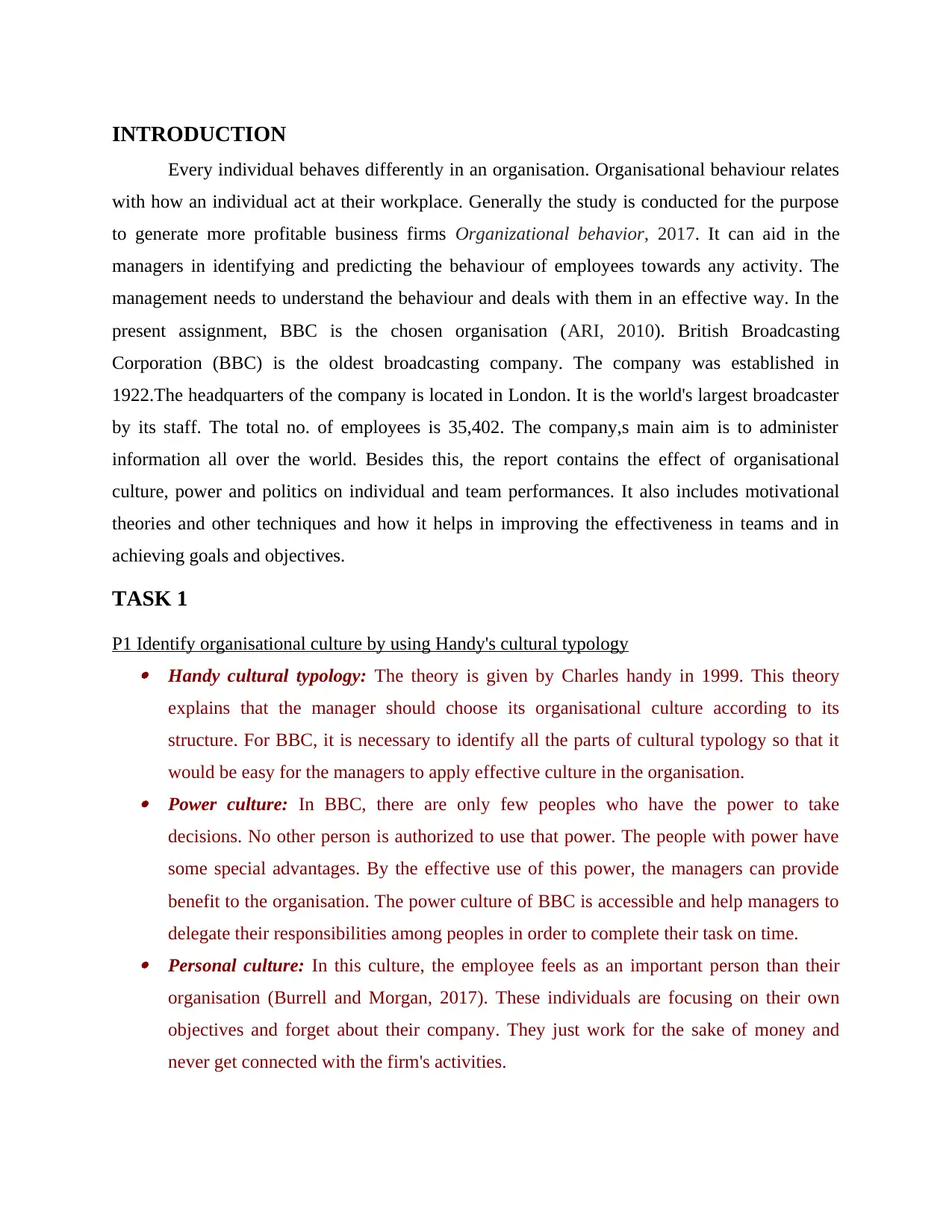
INTRODUCTION
Every individual behaves differently in an organisation. Organisational behaviour relates
with how an individual act at their workplace. Generally the study is conducted for the purpose
to generate more profitable business firms Organizational behavior, 2017. It can aid in the
managers in identifying and predicting the behaviour of employees towards any activity. The
management needs to understand the behaviour and deals with them in an effective way. In the
present assignment, BBC is the chosen organisation (ARI, 2010). British Broadcasting
Corporation (BBC) is the oldest broadcasting company. The company was established in
1922.The headquarters of the company is located in London. It is the world's largest broadcaster
by its staff. The total no. of employees is 35,402. The company,s main aim is to administer
information all over the world. Besides this, the report contains the effect of organisational
culture, power and politics on individual and team performances. It also includes motivational
theories and other techniques and how it helps in improving the effectiveness in teams and in
achieving goals and objectives.
TASK 1
P1 Identify organisational culture by using Handy's cultural typology Handy cultural typology: The theory is given by Charles handy in 1999. This theory
explains that the manager should choose its organisational culture according to its
structure. For BBC, it is necessary to identify all the parts of cultural typology so that it
would be easy for the managers to apply effective culture in the organisation. Power culture: In BBC, there are only few peoples who have the power to take
decisions. No other person is authorized to use that power. The people with power have
some special advantages. By the effective use of this power, the managers can provide
benefit to the organisation. The power culture of BBC is accessible and help managers to
delegate their responsibilities among peoples in order to complete their task on time. Personal culture: In this culture, the employee feels as an important person than their
organisation (Burrell and Morgan, 2017). These individuals are focusing on their own
objectives and forget about their company. They just work for the sake of money and
never get connected with the firm's activities.
Every individual behaves differently in an organisation. Organisational behaviour relates
with how an individual act at their workplace. Generally the study is conducted for the purpose
to generate more profitable business firms Organizational behavior, 2017. It can aid in the
managers in identifying and predicting the behaviour of employees towards any activity. The
management needs to understand the behaviour and deals with them in an effective way. In the
present assignment, BBC is the chosen organisation (ARI, 2010). British Broadcasting
Corporation (BBC) is the oldest broadcasting company. The company was established in
1922.The headquarters of the company is located in London. It is the world's largest broadcaster
by its staff. The total no. of employees is 35,402. The company,s main aim is to administer
information all over the world. Besides this, the report contains the effect of organisational
culture, power and politics on individual and team performances. It also includes motivational
theories and other techniques and how it helps in improving the effectiveness in teams and in
achieving goals and objectives.
TASK 1
P1 Identify organisational culture by using Handy's cultural typology Handy cultural typology: The theory is given by Charles handy in 1999. This theory
explains that the manager should choose its organisational culture according to its
structure. For BBC, it is necessary to identify all the parts of cultural typology so that it
would be easy for the managers to apply effective culture in the organisation. Power culture: In BBC, there are only few peoples who have the power to take
decisions. No other person is authorized to use that power. The people with power have
some special advantages. By the effective use of this power, the managers can provide
benefit to the organisation. The power culture of BBC is accessible and help managers to
delegate their responsibilities among peoples in order to complete their task on time. Personal culture: In this culture, the employee feels as an important person than their
organisation (Burrell and Morgan, 2017). These individuals are focusing on their own
objectives and forget about their company. They just work for the sake of money and
never get connected with the firm's activities.
⊘ This is a preview!⊘
Do you want full access?
Subscribe today to unlock all pages.

Trusted by 1+ million students worldwide
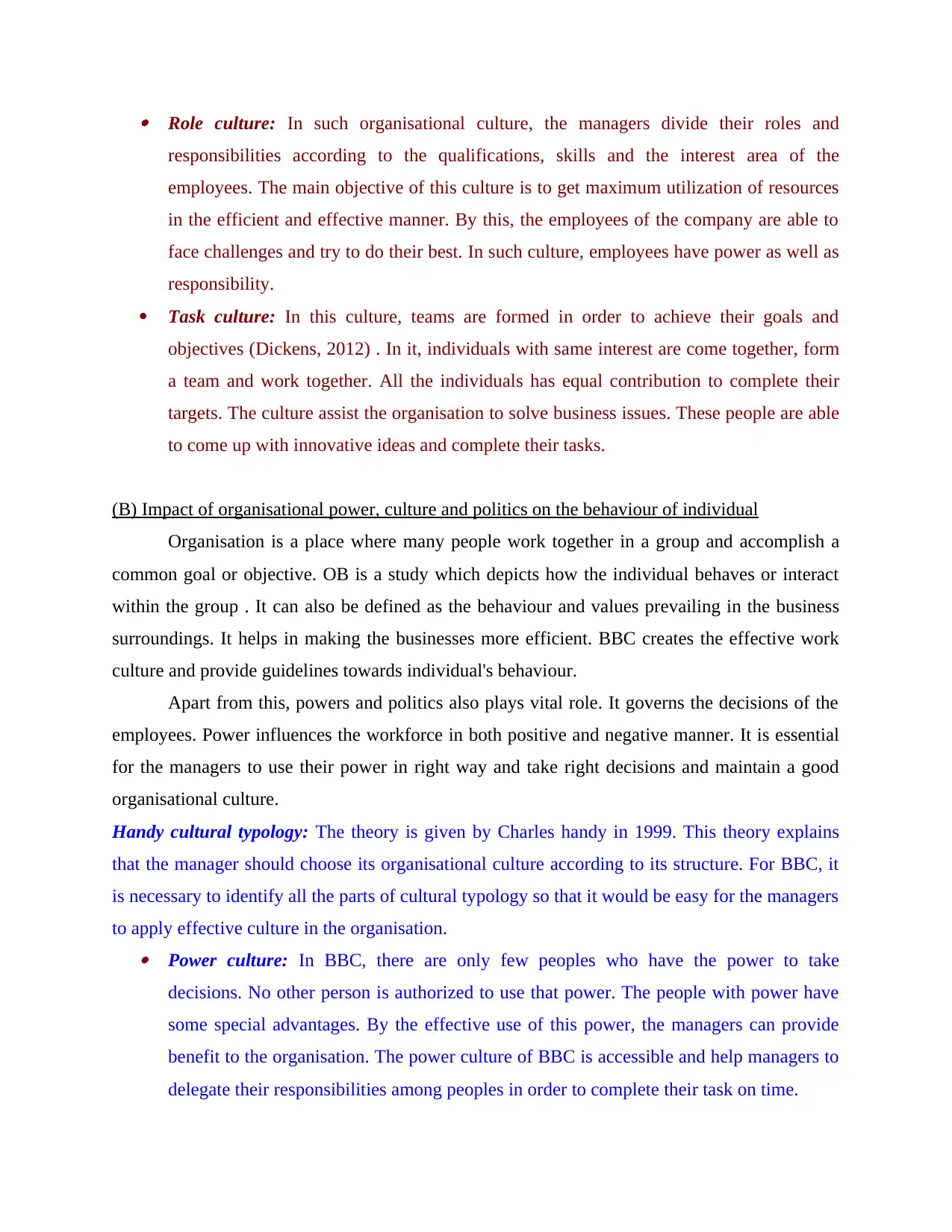
Role culture: In such organisational culture, the managers divide their roles and
responsibilities according to the qualifications, skills and the interest area of the
employees. The main objective of this culture is to get maximum utilization of resources
in the efficient and effective manner. By this, the employees of the company are able to
face challenges and try to do their best. In such culture, employees have power as well as
responsibility.
Task culture: In this culture, teams are formed in order to achieve their goals and
objectives (Dickens, 2012) . In it, individuals with same interest are come together, form
a team and work together. All the individuals has equal contribution to complete their
targets. The culture assist the organisation to solve business issues. These people are able
to come up with innovative ideas and complete their tasks.
(B) Impact of organisational power, culture and politics on the behaviour of individual
Organisation is a place where many people work together in a group and accomplish a
common goal or objective. OB is a study which depicts how the individual behaves or interact
within the group . It can also be defined as the behaviour and values prevailing in the business
surroundings. It helps in making the businesses more efficient. BBC creates the effective work
culture and provide guidelines towards individual's behaviour.
Apart from this, powers and politics also plays vital role. It governs the decisions of the
employees. Power influences the workforce in both positive and negative manner. It is essential
for the managers to use their power in right way and take right decisions and maintain a good
organisational culture.
Handy cultural typology: The theory is given by Charles handy in 1999. This theory explains
that the manager should choose its organisational culture according to its structure. For BBC, it
is necessary to identify all the parts of cultural typology so that it would be easy for the managers
to apply effective culture in the organisation. Power culture: In BBC, there are only few peoples who have the power to take
decisions. No other person is authorized to use that power. The people with power have
some special advantages. By the effective use of this power, the managers can provide
benefit to the organisation. The power culture of BBC is accessible and help managers to
delegate their responsibilities among peoples in order to complete their task on time.
responsibilities according to the qualifications, skills and the interest area of the
employees. The main objective of this culture is to get maximum utilization of resources
in the efficient and effective manner. By this, the employees of the company are able to
face challenges and try to do their best. In such culture, employees have power as well as
responsibility.
Task culture: In this culture, teams are formed in order to achieve their goals and
objectives (Dickens, 2012) . In it, individuals with same interest are come together, form
a team and work together. All the individuals has equal contribution to complete their
targets. The culture assist the organisation to solve business issues. These people are able
to come up with innovative ideas and complete their tasks.
(B) Impact of organisational power, culture and politics on the behaviour of individual
Organisation is a place where many people work together in a group and accomplish a
common goal or objective. OB is a study which depicts how the individual behaves or interact
within the group . It can also be defined as the behaviour and values prevailing in the business
surroundings. It helps in making the businesses more efficient. BBC creates the effective work
culture and provide guidelines towards individual's behaviour.
Apart from this, powers and politics also plays vital role. It governs the decisions of the
employees. Power influences the workforce in both positive and negative manner. It is essential
for the managers to use their power in right way and take right decisions and maintain a good
organisational culture.
Handy cultural typology: The theory is given by Charles handy in 1999. This theory explains
that the manager should choose its organisational culture according to its structure. For BBC, it
is necessary to identify all the parts of cultural typology so that it would be easy for the managers
to apply effective culture in the organisation. Power culture: In BBC, there are only few peoples who have the power to take
decisions. No other person is authorized to use that power. The people with power have
some special advantages. By the effective use of this power, the managers can provide
benefit to the organisation. The power culture of BBC is accessible and help managers to
delegate their responsibilities among peoples in order to complete their task on time.
Paraphrase This Document
Need a fresh take? Get an instant paraphrase of this document with our AI Paraphraser
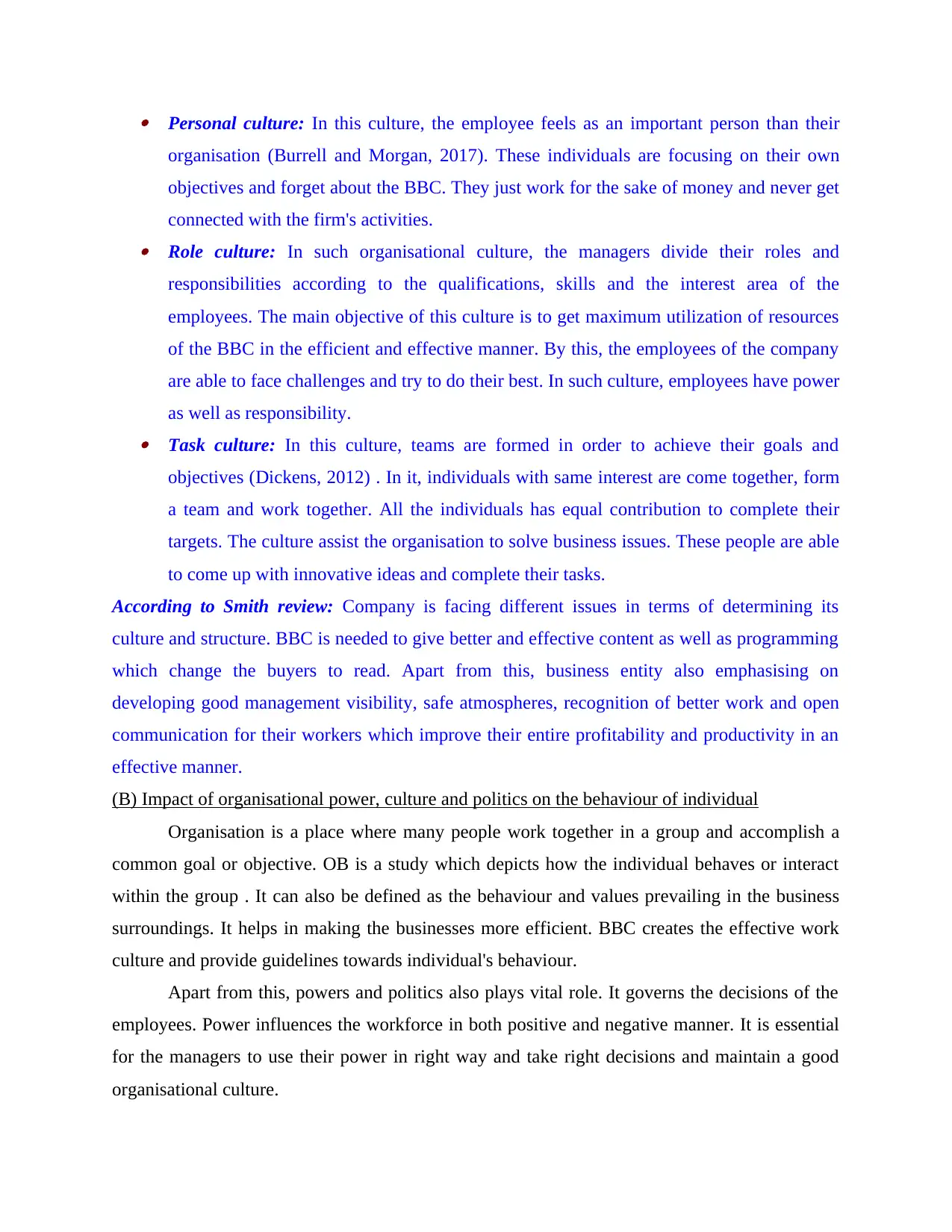
Personal culture: In this culture, the employee feels as an important person than their
organisation (Burrell and Morgan, 2017). These individuals are focusing on their own
objectives and forget about the BBC. They just work for the sake of money and never get
connected with the firm's activities. Role culture: In such organisational culture, the managers divide their roles and
responsibilities according to the qualifications, skills and the interest area of the
employees. The main objective of this culture is to get maximum utilization of resources
of the BBC in the efficient and effective manner. By this, the employees of the company
are able to face challenges and try to do their best. In such culture, employees have power
as well as responsibility. Task culture: In this culture, teams are formed in order to achieve their goals and
objectives (Dickens, 2012) . In it, individuals with same interest are come together, form
a team and work together. All the individuals has equal contribution to complete their
targets. The culture assist the organisation to solve business issues. These people are able
to come up with innovative ideas and complete their tasks.
According to Smith review: Company is facing different issues in terms of determining its
culture and structure. BBC is needed to give better and effective content as well as programming
which change the buyers to read. Apart from this, business entity also emphasising on
developing good management visibility, safe atmospheres, recognition of better work and open
communication for their workers which improve their entire profitability and productivity in an
effective manner.
(B) Impact of organisational power, culture and politics on the behaviour of individual
Organisation is a place where many people work together in a group and accomplish a
common goal or objective. OB is a study which depicts how the individual behaves or interact
within the group . It can also be defined as the behaviour and values prevailing in the business
surroundings. It helps in making the businesses more efficient. BBC creates the effective work
culture and provide guidelines towards individual's behaviour.
Apart from this, powers and politics also plays vital role. It governs the decisions of the
employees. Power influences the workforce in both positive and negative manner. It is essential
for the managers to use their power in right way and take right decisions and maintain a good
organisational culture.
organisation (Burrell and Morgan, 2017). These individuals are focusing on their own
objectives and forget about the BBC. They just work for the sake of money and never get
connected with the firm's activities. Role culture: In such organisational culture, the managers divide their roles and
responsibilities according to the qualifications, skills and the interest area of the
employees. The main objective of this culture is to get maximum utilization of resources
of the BBC in the efficient and effective manner. By this, the employees of the company
are able to face challenges and try to do their best. In such culture, employees have power
as well as responsibility. Task culture: In this culture, teams are formed in order to achieve their goals and
objectives (Dickens, 2012) . In it, individuals with same interest are come together, form
a team and work together. All the individuals has equal contribution to complete their
targets. The culture assist the organisation to solve business issues. These people are able
to come up with innovative ideas and complete their tasks.
According to Smith review: Company is facing different issues in terms of determining its
culture and structure. BBC is needed to give better and effective content as well as programming
which change the buyers to read. Apart from this, business entity also emphasising on
developing good management visibility, safe atmospheres, recognition of better work and open
communication for their workers which improve their entire profitability and productivity in an
effective manner.
(B) Impact of organisational power, culture and politics on the behaviour of individual
Organisation is a place where many people work together in a group and accomplish a
common goal or objective. OB is a study which depicts how the individual behaves or interact
within the group . It can also be defined as the behaviour and values prevailing in the business
surroundings. It helps in making the businesses more efficient. BBC creates the effective work
culture and provide guidelines towards individual's behaviour.
Apart from this, powers and politics also plays vital role. It governs the decisions of the
employees. Power influences the workforce in both positive and negative manner. It is essential
for the managers to use their power in right way and take right decisions and maintain a good
organisational culture.
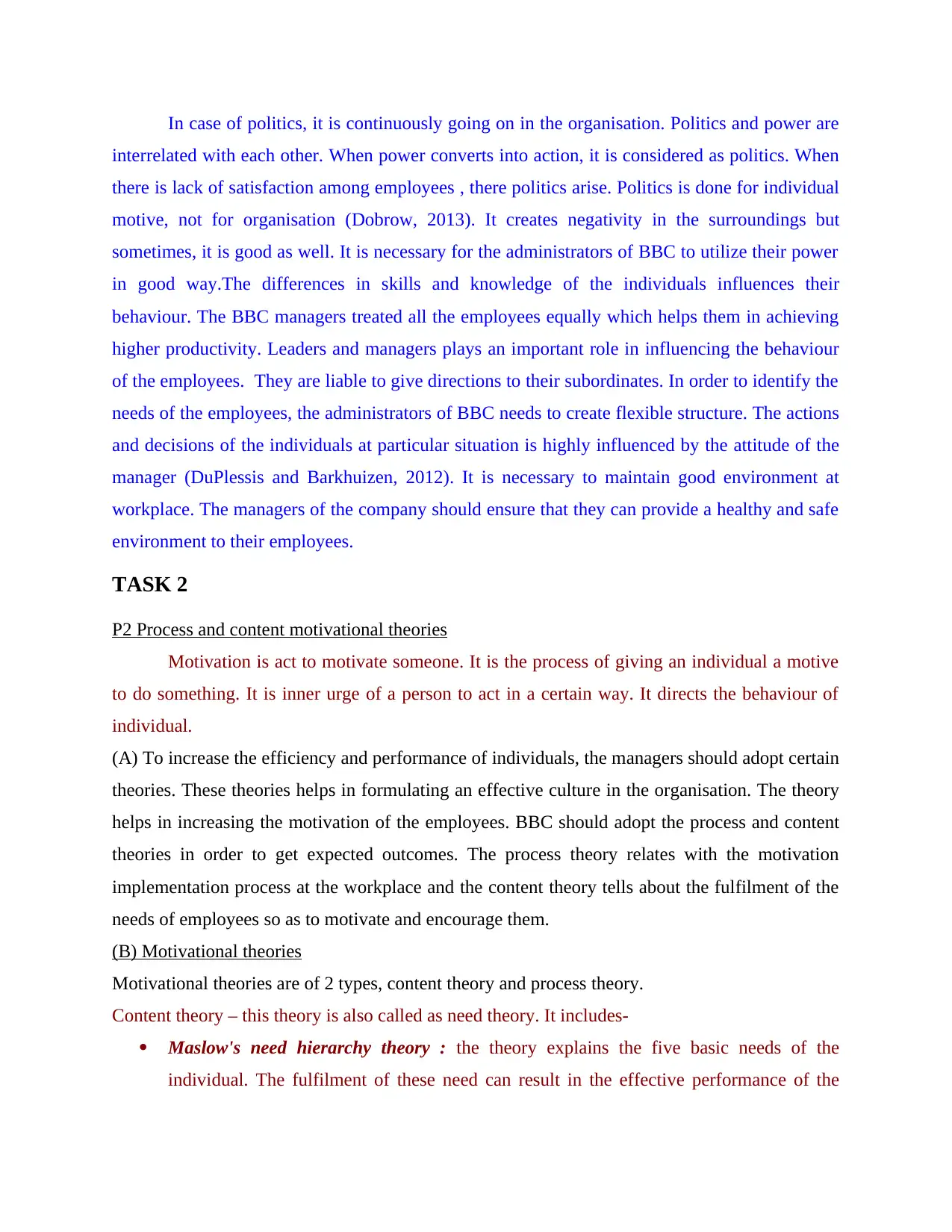
In case of politics, it is continuously going on in the organisation. Politics and power are
interrelated with each other. When power converts into action, it is considered as politics. When
there is lack of satisfaction among employees , there politics arise. Politics is done for individual
motive, not for organisation (Dobrow, 2013). It creates negativity in the surroundings but
sometimes, it is good as well. It is necessary for the administrators of BBC to utilize their power
in good way.The differences in skills and knowledge of the individuals influences their
behaviour. The BBC managers treated all the employees equally which helps them in achieving
higher productivity. Leaders and managers plays an important role in influencing the behaviour
of the employees. They are liable to give directions to their subordinates. In order to identify the
needs of the employees, the administrators of BBC needs to create flexible structure. The actions
and decisions of the individuals at particular situation is highly influenced by the attitude of the
manager (DuPlessis and Barkhuizen, 2012). It is necessary to maintain good environment at
workplace. The managers of the company should ensure that they can provide a healthy and safe
environment to their employees.
TASK 2
P2 Process and content motivational theories
Motivation is act to motivate someone. It is the process of giving an individual a motive
to do something. It is inner urge of a person to act in a certain way. It directs the behaviour of
individual.
(A) To increase the efficiency and performance of individuals, the managers should adopt certain
theories. These theories helps in formulating an effective culture in the organisation. The theory
helps in increasing the motivation of the employees. BBC should adopt the process and content
theories in order to get expected outcomes. The process theory relates with the motivation
implementation process at the workplace and the content theory tells about the fulfilment of the
needs of employees so as to motivate and encourage them.
(B) Motivational theories
Motivational theories are of 2 types, content theory and process theory.
Content theory – this theory is also called as need theory. It includes-
Maslow's need hierarchy theory : the theory explains the five basic needs of the
individual. The fulfilment of these need can result in the effective performance of the
interrelated with each other. When power converts into action, it is considered as politics. When
there is lack of satisfaction among employees , there politics arise. Politics is done for individual
motive, not for organisation (Dobrow, 2013). It creates negativity in the surroundings but
sometimes, it is good as well. It is necessary for the administrators of BBC to utilize their power
in good way.The differences in skills and knowledge of the individuals influences their
behaviour. The BBC managers treated all the employees equally which helps them in achieving
higher productivity. Leaders and managers plays an important role in influencing the behaviour
of the employees. They are liable to give directions to their subordinates. In order to identify the
needs of the employees, the administrators of BBC needs to create flexible structure. The actions
and decisions of the individuals at particular situation is highly influenced by the attitude of the
manager (DuPlessis and Barkhuizen, 2012). It is necessary to maintain good environment at
workplace. The managers of the company should ensure that they can provide a healthy and safe
environment to their employees.
TASK 2
P2 Process and content motivational theories
Motivation is act to motivate someone. It is the process of giving an individual a motive
to do something. It is inner urge of a person to act in a certain way. It directs the behaviour of
individual.
(A) To increase the efficiency and performance of individuals, the managers should adopt certain
theories. These theories helps in formulating an effective culture in the organisation. The theory
helps in increasing the motivation of the employees. BBC should adopt the process and content
theories in order to get expected outcomes. The process theory relates with the motivation
implementation process at the workplace and the content theory tells about the fulfilment of the
needs of employees so as to motivate and encourage them.
(B) Motivational theories
Motivational theories are of 2 types, content theory and process theory.
Content theory – this theory is also called as need theory. It includes-
Maslow's need hierarchy theory : the theory explains the five basic needs of the
individual. The fulfilment of these need can result in the effective performance of the
⊘ This is a preview!⊘
Do you want full access?
Subscribe today to unlock all pages.

Trusted by 1+ million students worldwide
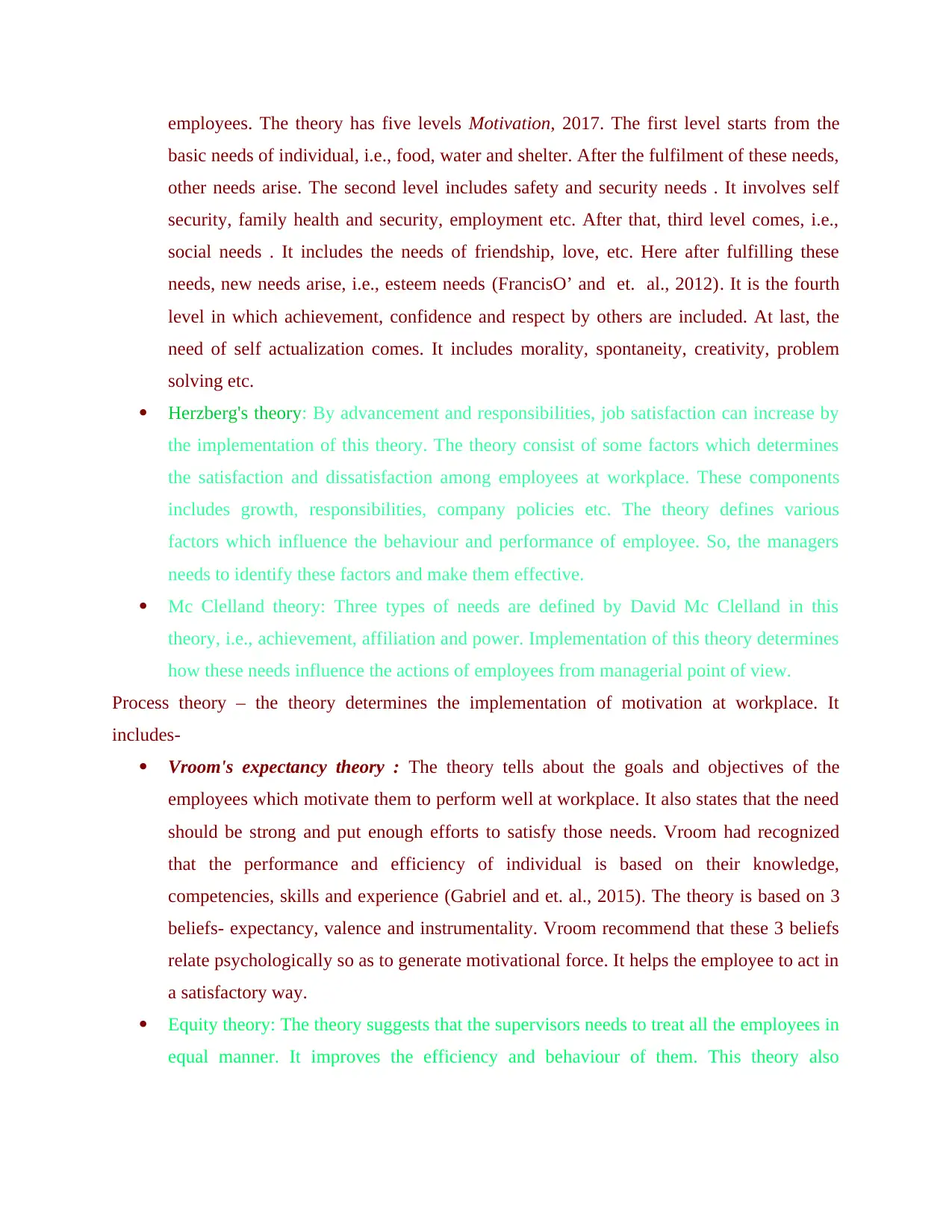
employees. The theory has five levels Motivation, 2017. The first level starts from the
basic needs of individual, i.e., food, water and shelter. After the fulfilment of these needs,
other needs arise. The second level includes safety and security needs . It involves self
security, family health and security, employment etc. After that, third level comes, i.e.,
social needs . It includes the needs of friendship, love, etc. Here after fulfilling these
needs, new needs arise, i.e., esteem needs (FrancisO’ and et. al., 2012). It is the fourth
level in which achievement, confidence and respect by others are included. At last, the
need of self actualization comes. It includes morality, spontaneity, creativity, problem
solving etc.
Herzberg's theory: By advancement and responsibilities, job satisfaction can increase by
the implementation of this theory. The theory consist of some factors which determines
the satisfaction and dissatisfaction among employees at workplace. These components
includes growth, responsibilities, company policies etc. The theory defines various
factors which influence the behaviour and performance of employee. So, the managers
needs to identify these factors and make them effective.
Mc Clelland theory: Three types of needs are defined by David Mc Clelland in this
theory, i.e., achievement, affiliation and power. Implementation of this theory determines
how these needs influence the actions of employees from managerial point of view.
Process theory – the theory determines the implementation of motivation at workplace. It
includes-
Vroom's expectancy theory : The theory tells about the goals and objectives of the
employees which motivate them to perform well at workplace. It also states that the need
should be strong and put enough efforts to satisfy those needs. Vroom had recognized
that the performance and efficiency of individual is based on their knowledge,
competencies, skills and experience (Gabriel and et. al., 2015). The theory is based on 3
beliefs- expectancy, valence and instrumentality. Vroom recommend that these 3 beliefs
relate psychologically so as to generate motivational force. It helps the employee to act in
a satisfactory way.
Equity theory: The theory suggests that the supervisors needs to treat all the employees in
equal manner. It improves the efficiency and behaviour of them. This theory also
basic needs of individual, i.e., food, water and shelter. After the fulfilment of these needs,
other needs arise. The second level includes safety and security needs . It involves self
security, family health and security, employment etc. After that, third level comes, i.e.,
social needs . It includes the needs of friendship, love, etc. Here after fulfilling these
needs, new needs arise, i.e., esteem needs (FrancisO’ and et. al., 2012). It is the fourth
level in which achievement, confidence and respect by others are included. At last, the
need of self actualization comes. It includes morality, spontaneity, creativity, problem
solving etc.
Herzberg's theory: By advancement and responsibilities, job satisfaction can increase by
the implementation of this theory. The theory consist of some factors which determines
the satisfaction and dissatisfaction among employees at workplace. These components
includes growth, responsibilities, company policies etc. The theory defines various
factors which influence the behaviour and performance of employee. So, the managers
needs to identify these factors and make them effective.
Mc Clelland theory: Three types of needs are defined by David Mc Clelland in this
theory, i.e., achievement, affiliation and power. Implementation of this theory determines
how these needs influence the actions of employees from managerial point of view.
Process theory – the theory determines the implementation of motivation at workplace. It
includes-
Vroom's expectancy theory : The theory tells about the goals and objectives of the
employees which motivate them to perform well at workplace. It also states that the need
should be strong and put enough efforts to satisfy those needs. Vroom had recognized
that the performance and efficiency of individual is based on their knowledge,
competencies, skills and experience (Gabriel and et. al., 2015). The theory is based on 3
beliefs- expectancy, valence and instrumentality. Vroom recommend that these 3 beliefs
relate psychologically so as to generate motivational force. It helps the employee to act in
a satisfactory way.
Equity theory: The theory suggests that the supervisors needs to treat all the employees in
equal manner. It improves the efficiency and behaviour of them. This theory also
Paraphrase This Document
Need a fresh take? Get an instant paraphrase of this document with our AI Paraphraser
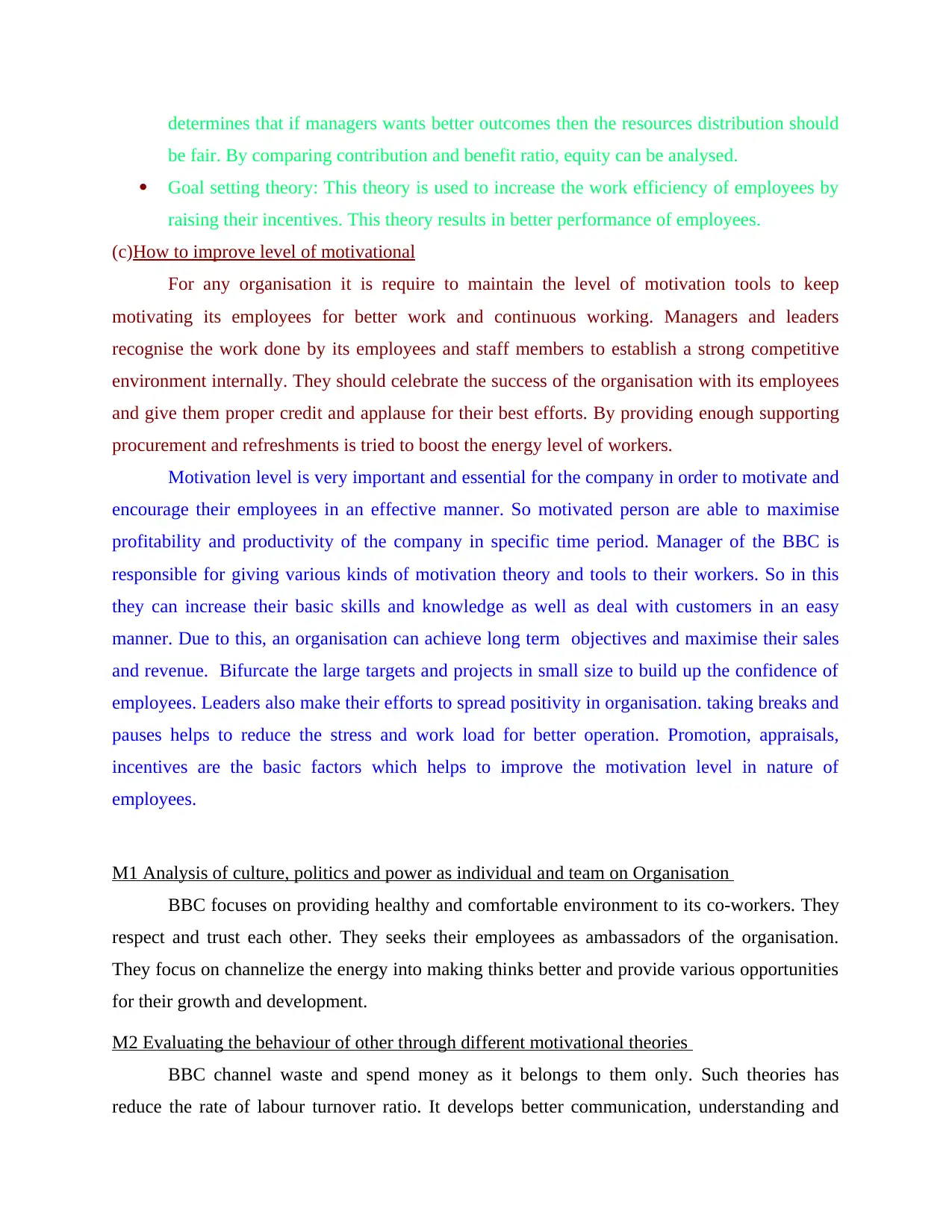
determines that if managers wants better outcomes then the resources distribution should
be fair. By comparing contribution and benefit ratio, equity can be analysed.
Goal setting theory: This theory is used to increase the work efficiency of employees by
raising their incentives. This theory results in better performance of employees.
(c)How to improve level of motivational
For any organisation it is require to maintain the level of motivation tools to keep
motivating its employees for better work and continuous working. Managers and leaders
recognise the work done by its employees and staff members to establish a strong competitive
environment internally. They should celebrate the success of the organisation with its employees
and give them proper credit and applause for their best efforts. By providing enough supporting
procurement and refreshments is tried to boost the energy level of workers.
Motivation level is very important and essential for the company in order to motivate and
encourage their employees in an effective manner. So motivated person are able to maximise
profitability and productivity of the company in specific time period. Manager of the BBC is
responsible for giving various kinds of motivation theory and tools to their workers. So in this
they can increase their basic skills and knowledge as well as deal with customers in an easy
manner. Due to this, an organisation can achieve long term objectives and maximise their sales
and revenue. Bifurcate the large targets and projects in small size to build up the confidence of
employees. Leaders also make their efforts to spread positivity in organisation. taking breaks and
pauses helps to reduce the stress and work load for better operation. Promotion, appraisals,
incentives are the basic factors which helps to improve the motivation level in nature of
employees.
M1 Analysis of culture, politics and power as individual and team on Organisation
BBC focuses on providing healthy and comfortable environment to its co-workers. They
respect and trust each other. They seeks their employees as ambassadors of the organisation.
They focus on channelize the energy into making thinks better and provide various opportunities
for their growth and development.
M2 Evaluating the behaviour of other through different motivational theories
BBC channel waste and spend money as it belongs to them only. Such theories has
reduce the rate of labour turnover ratio. It develops better communication, understanding and
be fair. By comparing contribution and benefit ratio, equity can be analysed.
Goal setting theory: This theory is used to increase the work efficiency of employees by
raising their incentives. This theory results in better performance of employees.
(c)How to improve level of motivational
For any organisation it is require to maintain the level of motivation tools to keep
motivating its employees for better work and continuous working. Managers and leaders
recognise the work done by its employees and staff members to establish a strong competitive
environment internally. They should celebrate the success of the organisation with its employees
and give them proper credit and applause for their best efforts. By providing enough supporting
procurement and refreshments is tried to boost the energy level of workers.
Motivation level is very important and essential for the company in order to motivate and
encourage their employees in an effective manner. So motivated person are able to maximise
profitability and productivity of the company in specific time period. Manager of the BBC is
responsible for giving various kinds of motivation theory and tools to their workers. So in this
they can increase their basic skills and knowledge as well as deal with customers in an easy
manner. Due to this, an organisation can achieve long term objectives and maximise their sales
and revenue. Bifurcate the large targets and projects in small size to build up the confidence of
employees. Leaders also make their efforts to spread positivity in organisation. taking breaks and
pauses helps to reduce the stress and work load for better operation. Promotion, appraisals,
incentives are the basic factors which helps to improve the motivation level in nature of
employees.
M1 Analysis of culture, politics and power as individual and team on Organisation
BBC focuses on providing healthy and comfortable environment to its co-workers. They
respect and trust each other. They seeks their employees as ambassadors of the organisation.
They focus on channelize the energy into making thinks better and provide various opportunities
for their growth and development.
M2 Evaluating the behaviour of other through different motivational theories
BBC channel waste and spend money as it belongs to them only. Such theories has
reduce the rate of labour turnover ratio. It develops better communication, understanding and
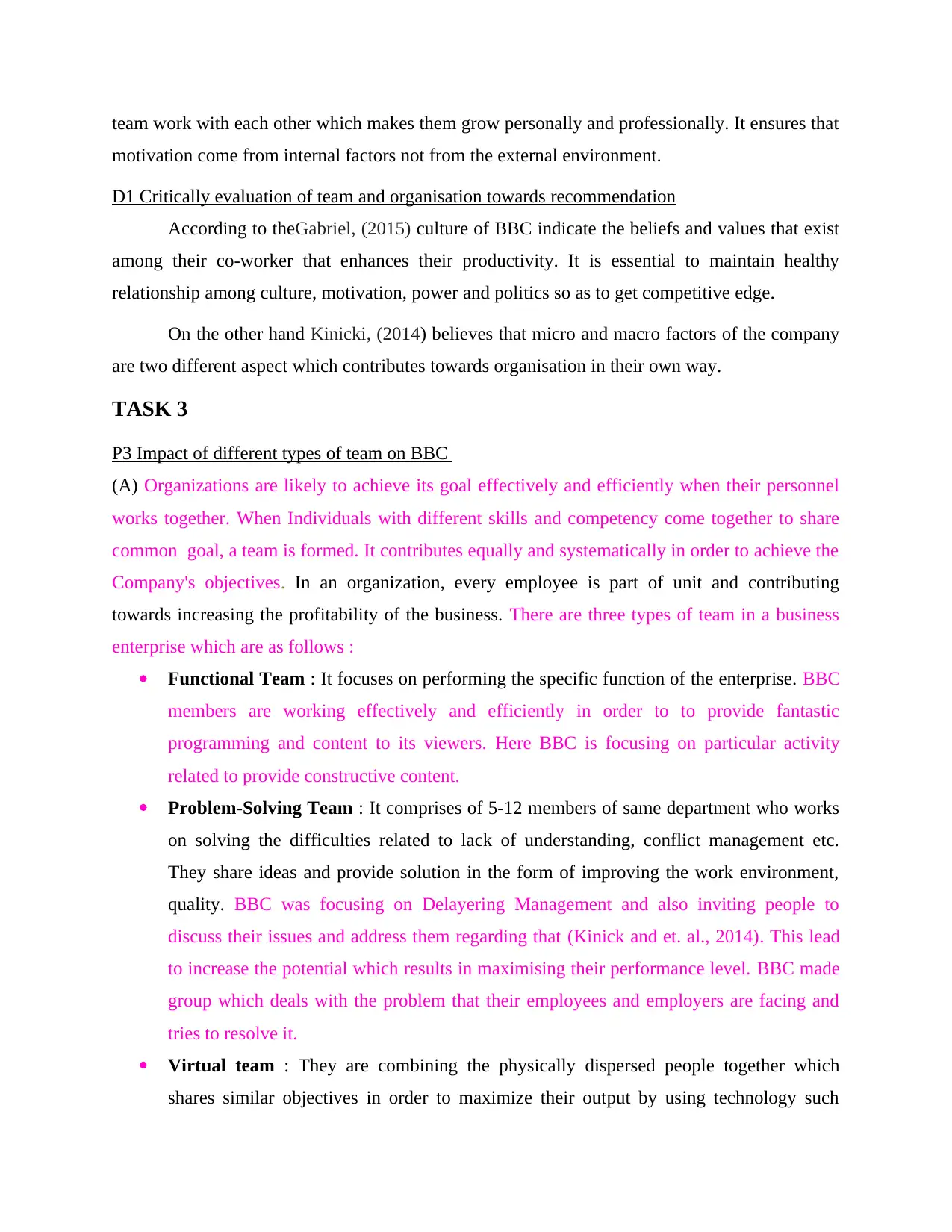
team work with each other which makes them grow personally and professionally. It ensures that
motivation come from internal factors not from the external environment.
D1 Critically evaluation of team and organisation towards recommendation
According to theGabriel, (2015) culture of BBC indicate the beliefs and values that exist
among their co-worker that enhances their productivity. It is essential to maintain healthy
relationship among culture, motivation, power and politics so as to get competitive edge.
On the other hand Kinicki, (2014) believes that micro and macro factors of the company
are two different aspect which contributes towards organisation in their own way.
TASK 3
P3 Impact of different types of team on BBC
(A) Organizations are likely to achieve its goal effectively and efficiently when their personnel
works together. When Individuals with different skills and competency come together to share
common goal, a team is formed. It contributes equally and systematically in order to achieve the
Company's objectives. In an organization, every employee is part of unit and contributing
towards increasing the profitability of the business. There are three types of team in a business
enterprise which are as follows :
Functional Team : It focuses on performing the specific function of the enterprise. BBC
members are working effectively and efficiently in order to to provide fantastic
programming and content to its viewers. Here BBC is focusing on particular activity
related to provide constructive content.
Problem-Solving Team : It comprises of 5-12 members of same department who works
on solving the difficulties related to lack of understanding, conflict management etc.
They share ideas and provide solution in the form of improving the work environment,
quality. BBC was focusing on Delayering Management and also inviting people to
discuss their issues and address them regarding that (Kinick and et. al., 2014). This lead
to increase the potential which results in maximising their performance level. BBC made
group which deals with the problem that their employees and employers are facing and
tries to resolve it.
Virtual team : They are combining the physically dispersed people together which
shares similar objectives in order to maximize their output by using technology such
motivation come from internal factors not from the external environment.
D1 Critically evaluation of team and organisation towards recommendation
According to theGabriel, (2015) culture of BBC indicate the beliefs and values that exist
among their co-worker that enhances their productivity. It is essential to maintain healthy
relationship among culture, motivation, power and politics so as to get competitive edge.
On the other hand Kinicki, (2014) believes that micro and macro factors of the company
are two different aspect which contributes towards organisation in their own way.
TASK 3
P3 Impact of different types of team on BBC
(A) Organizations are likely to achieve its goal effectively and efficiently when their personnel
works together. When Individuals with different skills and competency come together to share
common goal, a team is formed. It contributes equally and systematically in order to achieve the
Company's objectives. In an organization, every employee is part of unit and contributing
towards increasing the profitability of the business. There are three types of team in a business
enterprise which are as follows :
Functional Team : It focuses on performing the specific function of the enterprise. BBC
members are working effectively and efficiently in order to to provide fantastic
programming and content to its viewers. Here BBC is focusing on particular activity
related to provide constructive content.
Problem-Solving Team : It comprises of 5-12 members of same department who works
on solving the difficulties related to lack of understanding, conflict management etc.
They share ideas and provide solution in the form of improving the work environment,
quality. BBC was focusing on Delayering Management and also inviting people to
discuss their issues and address them regarding that (Kinick and et. al., 2014). This lead
to increase the potential which results in maximising their performance level. BBC made
group which deals with the problem that their employees and employers are facing and
tries to resolve it.
Virtual team : They are combining the physically dispersed people together which
shares similar objectives in order to maximize their output by using technology such
⊘ This is a preview!⊘
Do you want full access?
Subscribe today to unlock all pages.

Trusted by 1+ million students worldwide
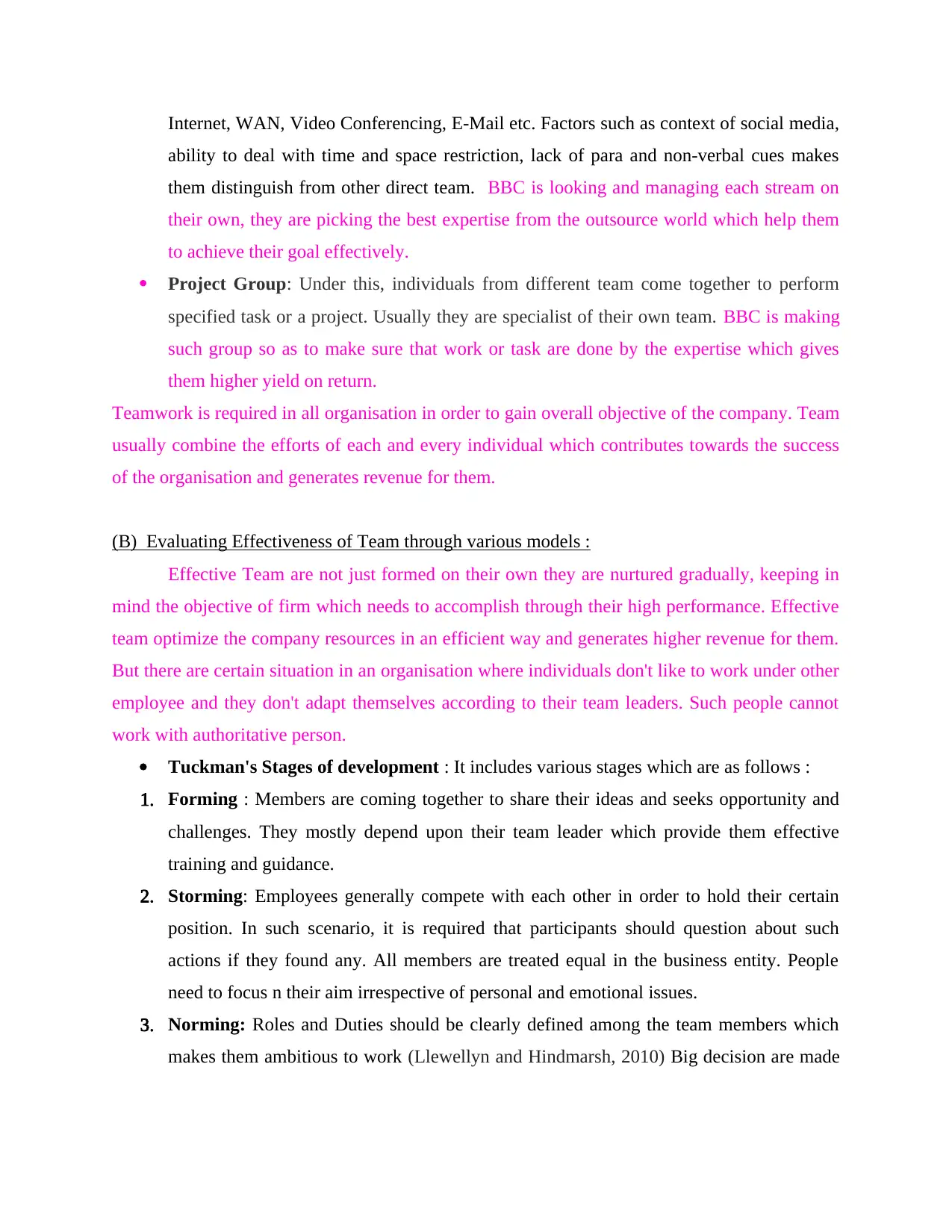
Internet, WAN, Video Conferencing, E-Mail etc. Factors such as context of social media,
ability to deal with time and space restriction, lack of para and non-verbal cues makes
them distinguish from other direct team. BBC is looking and managing each stream on
their own, they are picking the best expertise from the outsource world which help them
to achieve their goal effectively.
Project Group: Under this, individuals from different team come together to perform
specified task or a project. Usually they are specialist of their own team. BBC is making
such group so as to make sure that work or task are done by the expertise which gives
them higher yield on return.
Teamwork is required in all organisation in order to gain overall objective of the company. Team
usually combine the efforts of each and every individual which contributes towards the success
of the organisation and generates revenue for them.
(B) Evaluating Effectiveness of Team through various models :
Effective Team are not just formed on their own they are nurtured gradually, keeping in
mind the objective of firm which needs to accomplish through their high performance. Effective
team optimize the company resources in an efficient way and generates higher revenue for them.
But there are certain situation in an organisation where individuals don't like to work under other
employee and they don't adapt themselves according to their team leaders. Such people cannot
work with authoritative person.
Tuckman's Stages of development : It includes various stages which are as follows :
1. Forming : Members are coming together to share their ideas and seeks opportunity and
challenges. They mostly depend upon their team leader which provide them effective
training and guidance.
2. Storming: Employees generally compete with each other in order to hold their certain
position. In such scenario, it is required that participants should question about such
actions if they found any. All members are treated equal in the business entity. People
need to focus n their aim irrespective of personal and emotional issues.
3. Norming: Roles and Duties should be clearly defined among the team members which
makes them ambitious to work (Llewellyn and Hindmarsh, 2010) Big decision are made
ability to deal with time and space restriction, lack of para and non-verbal cues makes
them distinguish from other direct team. BBC is looking and managing each stream on
their own, they are picking the best expertise from the outsource world which help them
to achieve their goal effectively.
Project Group: Under this, individuals from different team come together to perform
specified task or a project. Usually they are specialist of their own team. BBC is making
such group so as to make sure that work or task are done by the expertise which gives
them higher yield on return.
Teamwork is required in all organisation in order to gain overall objective of the company. Team
usually combine the efforts of each and every individual which contributes towards the success
of the organisation and generates revenue for them.
(B) Evaluating Effectiveness of Team through various models :
Effective Team are not just formed on their own they are nurtured gradually, keeping in
mind the objective of firm which needs to accomplish through their high performance. Effective
team optimize the company resources in an efficient way and generates higher revenue for them.
But there are certain situation in an organisation where individuals don't like to work under other
employee and they don't adapt themselves according to their team leaders. Such people cannot
work with authoritative person.
Tuckman's Stages of development : It includes various stages which are as follows :
1. Forming : Members are coming together to share their ideas and seeks opportunity and
challenges. They mostly depend upon their team leader which provide them effective
training and guidance.
2. Storming: Employees generally compete with each other in order to hold their certain
position. In such scenario, it is required that participants should question about such
actions if they found any. All members are treated equal in the business entity. People
need to focus n their aim irrespective of personal and emotional issues.
3. Norming: Roles and Duties should be clearly defined among the team members which
makes them ambitious to work (Llewellyn and Hindmarsh, 2010) Big decision are made
Paraphrase This Document
Need a fresh take? Get an instant paraphrase of this document with our AI Paraphraser
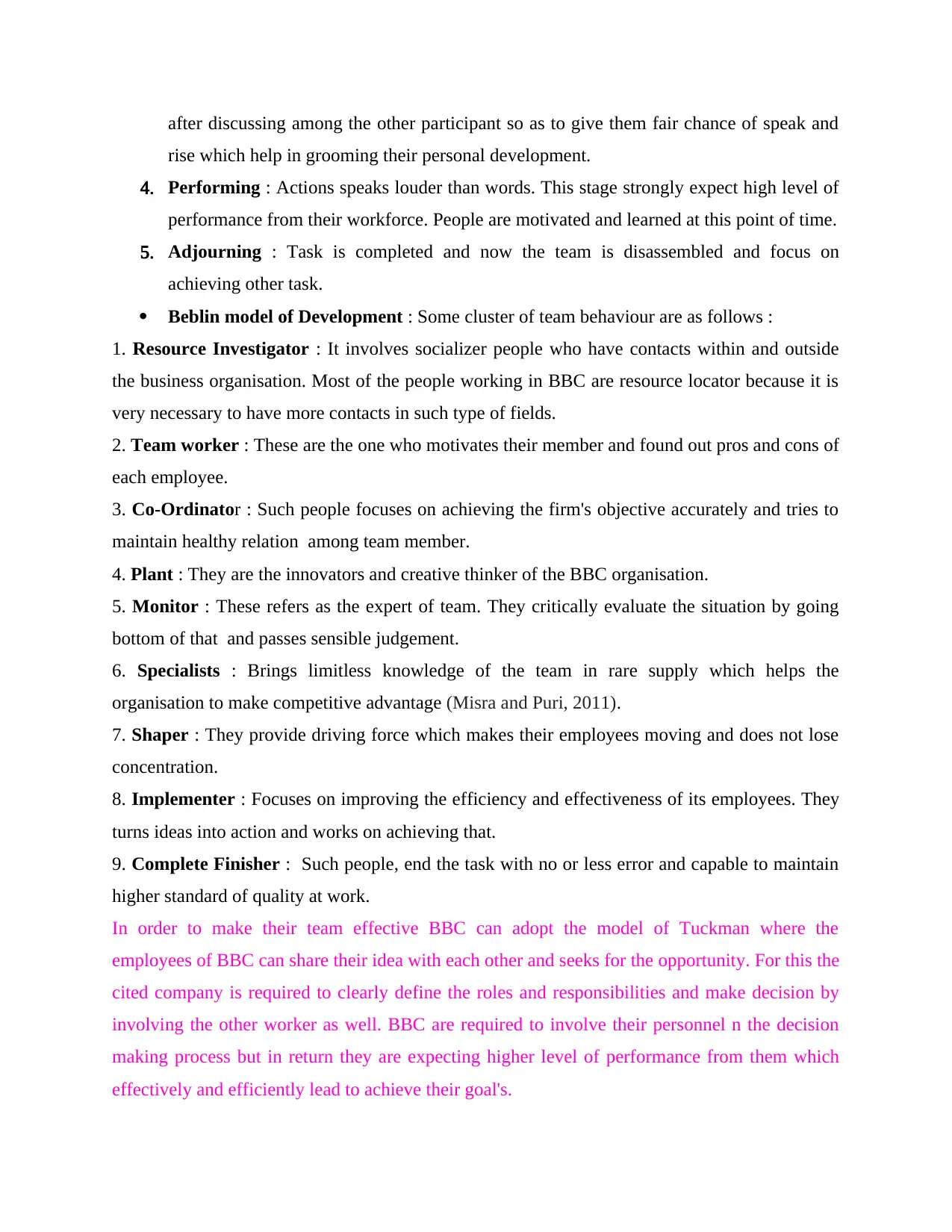
after discussing among the other participant so as to give them fair chance of speak and
rise which help in grooming their personal development.
4. Performing : Actions speaks louder than words. This stage strongly expect high level of
performance from their workforce. People are motivated and learned at this point of time.
5. Adjourning : Task is completed and now the team is disassembled and focus on
achieving other task.
Beblin model of Development : Some cluster of team behaviour are as follows :
1. Resource Investigator : It involves socializer people who have contacts within and outside
the business organisation. Most of the people working in BBC are resource locator because it is
very necessary to have more contacts in such type of fields.
2. Team worker : These are the one who motivates their member and found out pros and cons of
each employee.
3. Co-Ordinator : Such people focuses on achieving the firm's objective accurately and tries to
maintain healthy relation among team member.
4. Plant : They are the innovators and creative thinker of the BBC organisation.
5. Monitor : These refers as the expert of team. They critically evaluate the situation by going
bottom of that and passes sensible judgement.
6. Specialists : Brings limitless knowledge of the team in rare supply which helps the
organisation to make competitive advantage (Misra and Puri, 2011).
7. Shaper : They provide driving force which makes their employees moving and does not lose
concentration.
8. Implementer : Focuses on improving the efficiency and effectiveness of its employees. They
turns ideas into action and works on achieving that.
9. Complete Finisher : Such people, end the task with no or less error and capable to maintain
higher standard of quality at work.
In order to make their team effective BBC can adopt the model of Tuckman where the
employees of BBC can share their idea with each other and seeks for the opportunity. For this the
cited company is required to clearly define the roles and responsibilities and make decision by
involving the other worker as well. BBC are required to involve their personnel n the decision
making process but in return they are expecting higher level of performance from them which
effectively and efficiently lead to achieve their goal's.
rise which help in grooming their personal development.
4. Performing : Actions speaks louder than words. This stage strongly expect high level of
performance from their workforce. People are motivated and learned at this point of time.
5. Adjourning : Task is completed and now the team is disassembled and focus on
achieving other task.
Beblin model of Development : Some cluster of team behaviour are as follows :
1. Resource Investigator : It involves socializer people who have contacts within and outside
the business organisation. Most of the people working in BBC are resource locator because it is
very necessary to have more contacts in such type of fields.
2. Team worker : These are the one who motivates their member and found out pros and cons of
each employee.
3. Co-Ordinator : Such people focuses on achieving the firm's objective accurately and tries to
maintain healthy relation among team member.
4. Plant : They are the innovators and creative thinker of the BBC organisation.
5. Monitor : These refers as the expert of team. They critically evaluate the situation by going
bottom of that and passes sensible judgement.
6. Specialists : Brings limitless knowledge of the team in rare supply which helps the
organisation to make competitive advantage (Misra and Puri, 2011).
7. Shaper : They provide driving force which makes their employees moving and does not lose
concentration.
8. Implementer : Focuses on improving the efficiency and effectiveness of its employees. They
turns ideas into action and works on achieving that.
9. Complete Finisher : Such people, end the task with no or less error and capable to maintain
higher standard of quality at work.
In order to make their team effective BBC can adopt the model of Tuckman where the
employees of BBC can share their idea with each other and seeks for the opportunity. For this the
cited company is required to clearly define the roles and responsibilities and make decision by
involving the other worker as well. BBC are required to involve their personnel n the decision
making process but in return they are expecting higher level of performance from them which
effectively and efficiently lead to achieve their goal's.
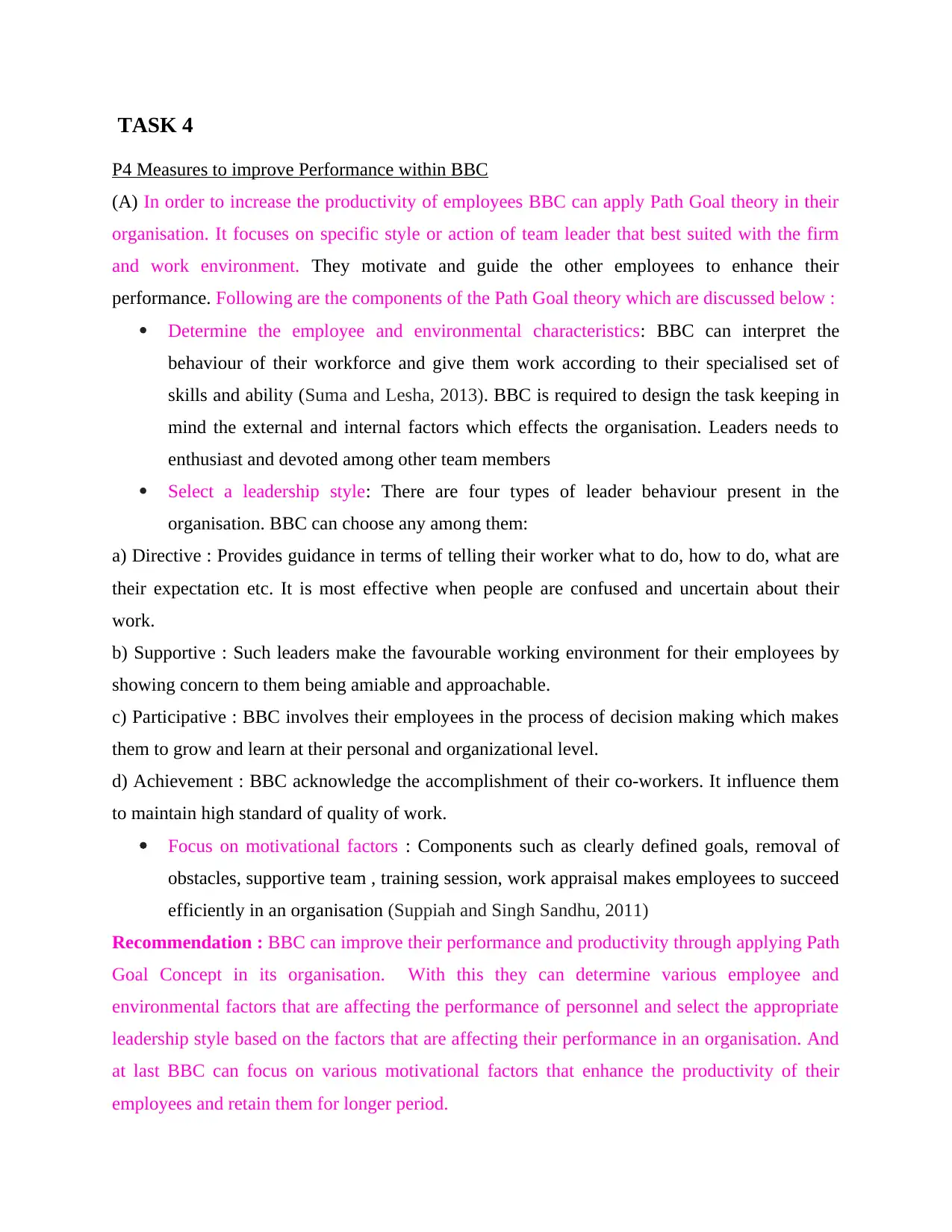
TASK 4
P4 Measures to improve Performance within BBC
(A) In order to increase the productivity of employees BBC can apply Path Goal theory in their
organisation. It focuses on specific style or action of team leader that best suited with the firm
and work environment. They motivate and guide the other employees to enhance their
performance. Following are the components of the Path Goal theory which are discussed below :
Determine the employee and environmental characteristics: BBC can interpret the
behaviour of their workforce and give them work according to their specialised set of
skills and ability (Suma and Lesha, 2013). BBC is required to design the task keeping in
mind the external and internal factors which effects the organisation. Leaders needs to
enthusiast and devoted among other team members
Select a leadership style: There are four types of leader behaviour present in the
organisation. BBC can choose any among them:
a) Directive : Provides guidance in terms of telling their worker what to do, how to do, what are
their expectation etc. It is most effective when people are confused and uncertain about their
work.
b) Supportive : Such leaders make the favourable working environment for their employees by
showing concern to them being amiable and approachable.
c) Participative : BBC involves their employees in the process of decision making which makes
them to grow and learn at their personal and organizational level.
d) Achievement : BBC acknowledge the accomplishment of their co-workers. It influence them
to maintain high standard of quality of work.
Focus on motivational factors : Components such as clearly defined goals, removal of
obstacles, supportive team , training session, work appraisal makes employees to succeed
efficiently in an organisation (Suppiah and Singh Sandhu, 2011)
Recommendation : BBC can improve their performance and productivity through applying Path
Goal Concept in its organisation. With this they can determine various employee and
environmental factors that are affecting the performance of personnel and select the appropriate
leadership style based on the factors that are affecting their performance in an organisation. And
at last BBC can focus on various motivational factors that enhance the productivity of their
employees and retain them for longer period.
P4 Measures to improve Performance within BBC
(A) In order to increase the productivity of employees BBC can apply Path Goal theory in their
organisation. It focuses on specific style or action of team leader that best suited with the firm
and work environment. They motivate and guide the other employees to enhance their
performance. Following are the components of the Path Goal theory which are discussed below :
Determine the employee and environmental characteristics: BBC can interpret the
behaviour of their workforce and give them work according to their specialised set of
skills and ability (Suma and Lesha, 2013). BBC is required to design the task keeping in
mind the external and internal factors which effects the organisation. Leaders needs to
enthusiast and devoted among other team members
Select a leadership style: There are four types of leader behaviour present in the
organisation. BBC can choose any among them:
a) Directive : Provides guidance in terms of telling their worker what to do, how to do, what are
their expectation etc. It is most effective when people are confused and uncertain about their
work.
b) Supportive : Such leaders make the favourable working environment for their employees by
showing concern to them being amiable and approachable.
c) Participative : BBC involves their employees in the process of decision making which makes
them to grow and learn at their personal and organizational level.
d) Achievement : BBC acknowledge the accomplishment of their co-workers. It influence them
to maintain high standard of quality of work.
Focus on motivational factors : Components such as clearly defined goals, removal of
obstacles, supportive team , training session, work appraisal makes employees to succeed
efficiently in an organisation (Suppiah and Singh Sandhu, 2011)
Recommendation : BBC can improve their performance and productivity through applying Path
Goal Concept in its organisation. With this they can determine various employee and
environmental factors that are affecting the performance of personnel and select the appropriate
leadership style based on the factors that are affecting their performance in an organisation. And
at last BBC can focus on various motivational factors that enhance the productivity of their
employees and retain them for longer period.
⊘ This is a preview!⊘
Do you want full access?
Subscribe today to unlock all pages.

Trusted by 1+ million students worldwide
1 out of 16
Related Documents
Your All-in-One AI-Powered Toolkit for Academic Success.
+13062052269
info@desklib.com
Available 24*7 on WhatsApp / Email
![[object Object]](/_next/static/media/star-bottom.7253800d.svg)
Unlock your academic potential
Copyright © 2020–2026 A2Z Services. All Rights Reserved. Developed and managed by ZUCOL.





